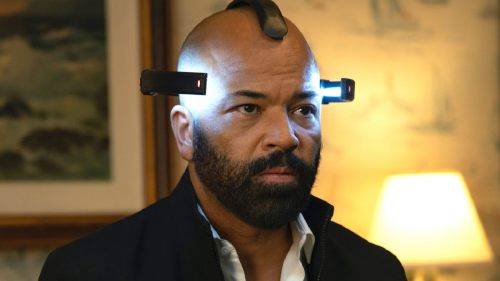SXSW Review: ELVIS PRESLEY - THE SEARCHER Is An Exhaustive Portrait Of A Lonely Enigma
"The image is one thing. A human being is another."
We never see any of the interview subjects in Elvis Presley: The Searcher, despite most of them being pop music luminaries. The voices of Bruce Springsteen, Tom Petty, Stax Records' David Porter, Sun Records' Sam Phillips, Priscilla Presley, and even archival audio clippings from the King himself float over a continuous, free-flowing montage of footage – taken from home movies, concert recordings, media appearances, and feature films – like ghosts, commenting on a great God they're still attempting to make complete sense of.
We're transfixed by the image of Elvis, as the visuals proceed in chronological order. The legendary performer evolves from wild, churchgoing Mississippi youth, to uncontainable Memphis rockabilly stage presence, to GI Joe stationed in Germany, to kitschy cinema star, to black-clad '68 Special comeback kid, to a faded neo-opera singer – belly bloated with bad food, guilt and regret – his manager milking every last dime from the King’s body before his heart gives out in August of '77. Elvis was our loneliest American enigma, a human being who transcended race and economics, only to get eaten alive by the "father" he trusted his career to. The King is dead, but we're still mesmerized by his otherworldly persona over forty years later, barely comprehending the human being who inhabited the icon.
The Searcher doesn't seem to care about your own opinions on Elvis. Director Thom Zimney is completely unconcerned with whether you think he's one of the greatest rock-and-roll stars of all time, or perhaps one of the first true culture vultures: eating up black spirituals and then combining them with country and western tunes to create a whole new sonic beast. The movie's made up its mind regarding Elvis’ place in history, anointing him perhaps the greatest American artist to ever grace the stage with his talents.
Part of this blatant hero worship has to do with Presley's estate giving the picture its full support (after all, Graceland's never going to have a hit piece’s back). Instead, The Searcher is asking what it meant to be a hero to 50,000,000 Elvis fans. Based on Presley’s own words – plus the examinations of those like Petty and Springsteen, who obviously looked to the King as a premiere influence – Zimney is examining what Gospel, Soul, R&B, Country/Western and even Pop Music meant to a Southern white man who grew up dirt poor, practically without a father, and possibly without a future beyond music.
Broken up into two parts – as The Searcher runs just shy of three-and-a-half hours – Zimny takes his time, trying to fill in as much background on Presley as he can before the artist recorded those early tracks with Sam Phillips in Memphis' Sun Records studios. He lets us soak in the boyhood melancholy of his father going to prison, and Elvis' subsequent undying devotion to his mother, Gladys Presley. There’s those early shows, where Elvis was a "wild animal" on stage, his hips signaling their own sexual revolution as pearl-clutchers gasped in panic. TV hosts attempted to humiliate Elvis by turning Presley's persona into a novelty act to which they could condescend, many in the white establishment not wanting this underclass young man to bring "black music" to the masses. However, Elvis was such a force of nature that not even racist '50s regional broadcasts could subdue his swinging intensity.
Along comes Colonel Tom Parker, causing Presley to break from Sun Records, as the professional carnival barker promised national fame and "merchandising" to the future King. But this is where the understanding of Presley's choices becomes murky. Not even Priscilla Presley can offer up a cogent response as to why Elvis put so much trust into the man who would essentially work evil magic to undo his unruly youthful image. First, he insisted no special accommodations be made for Elvis when he was drafted and sent to Germany, opting instead to record a wealth of material that was released (and profited from) while the singer was overseas. After that, Parker continuously negotiated contracts with movie studios that transformed the rock legend into little more than a poppy OST maven, tarnishing his status as a disobedient sex symbol.
Even when Elvis flexes and strains to come back following the completion of his service duty – his '68 TV Special viewed as a real “make or break” moment for the artist’s career – the Colonel is always lurking in the background: a devil looking to take down this Patron Saint of Rock. By the time Parker's pushing him through a grueling '70s touring process – hundreds of dates forcing the King to increase his intake of uppers and downers just to get by while his body puffed and swelled – The Searcher is clearly positing that Elvis was, in fact, not a human being to the person he arguably put the greatest amount of faith in. For Colonel Tom Parker, the musician was a cash machine: an image being utilized to make this enterprising monster rich.
The Searcher tries to bring as wide a comprehensive lens to the King as possible, and for the most part succeeds in spades. It’s only when Zimney attempts to contextualize his music – in a very similar fashion to the way Ezra Edelman did with OJ Simpson's rise and fall in Made In America – that the picture lacks ever so slightly. The Searcher touches on what a white man creating a new sound out of black culture during the beginnings/height of the Civil Rights Movement meant to America as a whole, but never dives deep enough to really deliver a substantial analysis. Perhaps an eight-hour cut – which this writer would gladly sit through – could offer an interrogation of that nature. Still, it's difficult to fault a documentary this ambitiously spellbinding, as we're invited into the soul of a legend, in the hopes of letting us feel and appreciate its fabric, while simultaneously seeing where the grueling taxations of fame caused it to split at the seams.



